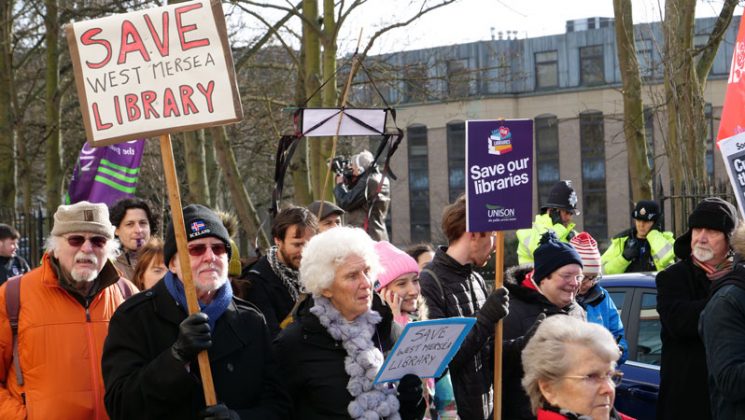UNISON is currently drawing up a Cultural Charter for Libraries, in a dramatic bid to protect the UK’s threatened library services.
Councils will be challenged to sign the charter and commit themselves to maintaining fully staffed in-house library services, with sufficient funding for their future development.
The move is the latest in UNISON’s ongoing campaign to oppose ‘closure by stealth’ as councils lure local communities to run library services on their behalf – without the resources or professional staff that make them tick.
Locally, the union has been involved in successful campaigns this year to keep libraries open and is battling for others. But it remains concerned at the trend that continues to put them at risk.
Communities “pivotal” to success
“So many libraries have experienced staff cuts and so many are being run by volunteers that we no longer have a national library service. It’s been totally fragmented,” says Sarah Pearce, assistant national officer for local government.
“That’s why it’s crucial that UNISON branches work with their local communities to save their libraries. We all want the same thing – a quality public service.”
One such campaign in Neath Port Talbot, Wales, saved four libraries from closure, after UNISON led a local protest against the plans. The union believes that getting the community involved in that fight was “pivotal” to its success.
And Essex County Council recently performed a U-turn on its plans to close a number of its libraries, after a high-profile campaign which saw UNISON join forces with other local campaigners and included marches, lobbies of council meetings, petitioning, the involvement of local schools and celebrity tweeting,
However, that story has since become complicated, in a way that highlights the thorny problem of volunteers – whether in the form of parish councils, charitable trusts or even individuals.
Initially, the council had planned to close 25 libraries and seek community groups to run another 19. While agreeing not to close any, it’s now asking the community to take responsibility for the entire 44.

Andrew Coburn, the retired members secretary of UNISON’s Essex County branch and a member of Save Our Libraries Essex (SOLE) says that the £18,000 over three years being offered to community groups to take on the running of libraries “is not going to get them very far”.
Moreover, the council has stated that libraries would not remain in their existing buildings – which it will likely sell – meaning that the volunteers would have to find them another home.
And hundreds of library jobs are at risk.
“I’m disappointed and angry that Essex County Council is not investing in building a properly run and funded statutory public library service,” says Mr Coburn (pictured above), who worked for the library services for 37 years (latterly as an acquisitions and cataloguing librarian) before being made redundant three years ago.
“Using communities to run libraries is closure by stealth. It will affect the jobs of many UNISON and potential UNISON members, as well as providing a worse service – if indeed there is a service in a few years’ time.
“Councillors are not showing a real understanding and appreciation of what a decent library service looks like and how it can serve the community.”
Softening up for privatisation
Sarah Pearce says that what is happening in Essex reflects the national pattern.
“Councils are absolutely strapped for cash. They know how publicly disagreeable it would be to close libraries. But in order to keep them open they are farming them out at a frightening rate to volunteers to run them.
“Now, the desire to keep your local library open is completely understandable, but UNISON knows that they are just being softened up for privatisation or closure.
“The money being offered is not adequate to invest in the service. That means the service deteriorates, so there are fewer users, which allows the council to argue that it might as well be closed anyway. It’s a vicious circle.”
And those hardest hit by closures are the elderly and vulnerable who might not be able to make their way to the only libraries remaining open, in the centre of town.
Community libraries are being set up to fail
Ms Pearce feels that UNISON is well placed to educate communities about the dangers of handing libraries over to volunteers and on the need for paid staff.
“By its very definition, a voluntary service is not sustainable. Workers have no contract. Are there set hours? Can you rely on them? Are they doing the jobs that need to be done or the ones they want to do? How much training have they had? Are they protected in the event of an accident?
“If libraries are run by volunteers they are not experts. They don’t have the knowledge, expertise or experience of library workers. Library workers don’t just stamp books. They are the portal to a world of information and advice.”
Unfortunately, a committed campaign in Ealing, west London – which saw over 17,000 signatures across eight petitions – seems to have failed to prevent the borough council from handing five libraries to community groups.
The UNISON branch believes 105 jobs are at risk, while “community libraries are being set up to fail.”

In Essex the battle is far from over. After the council’s sleight of hand, SOLE issued a plea to community groups to withdraw their interest in taking over libraries – effectively asking them to call the council’s bluff.
Says Mr Coburn: “We pointed out that the council has promised not to close libraries for five years. If you withdraw, they are committed to running them, with trained staff, a proper book stock, etc…”
So far, four community groups have rescinded their expressions of interest. SOLE will be continuing its campaign with a day of action in September.
Ms Pearce praises “to the hilt” those activists who are at the frontline of protecting libraries. “These are campaigns that everyone can learn so much from. It’s very important to share that experience.”
Alongside the Cultural Charter, UNISON is carrying out research with Cardiff University into the impact of volunteering on the library service – the results of which will inform future campaigning.
Love your libraries: read more UNISON stories



I find this absolutely disgusting as a library is the hubof the community for many people. Volunteers do have a role I running libraries by helping with task With It having access to users’ data by doing simple task to help the paid staff in employment. I find it difficult in this age of data protection to see how volunteers alone can run libraries. I myself feel that it puts the privacy of library users’ information at risk as what absolute and definite protection of their information can be given by the service which is run by people who may possibly have access to such information and doesn’t get paid so is not at risk of losing anything but their voluntary commitment, despite signing forms and being given screening to say they won’t breach regulations. In fairness I know that all people would never contemplate looking at information in this manner but there are always the unscrupulous few who would do so.
As a former Team Leader in North Tyneside libraries and who lost her job in a restructure, I cannot emphasize how important our libraries are to everyone in the community. They are a mine of information and form a very important part of social contact. Schools find them invaluble as they provide extra resources at a time when they are losing vital funding and losing staff. The elderly use it as a point of contact with others in the community, to avoid being isolated, enjoying craft sessions, book clubs or having a natter as well as choosing books to read that they would otherwise not be able to afford. Parents of babies and young children meet up with others to share knowledge and have quality time with their children. School children need access to information, social networking to help complete homework and to have the pleasure of selecting books that they enjoy. Planned activities and events create a safe and imaginative place for both adults and children. I cannot express enough how vital the library service is to the community.
I am living in the eastern coastal area of Ross-shire, Scotland. We have a brilliant Mobile Library service which is valued by many locals also Catherine the mobile librarian is so very helpful and caring towards more disabled borrowers. Recently the Library Van was taken out of service and now Catherine has to work from a small delivery van which means borrowers have to stand outside and choose books from crates placed on the edge of the van. This means both Catherine and borrowers have to choose books and carry out the necessary paperwork in all weathers. In the howling gales and stormy weather we often get in this coastal area the situation is crazy . Highlife Highland who manage the service have an annual turnover of 2 Million…..surely they can afford to provide a suitable van or adapted larger Transit van to provide a safe and proper facility .